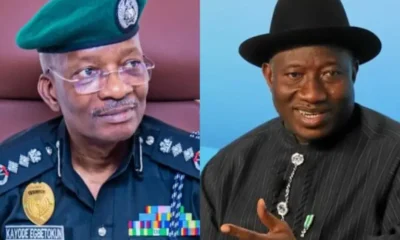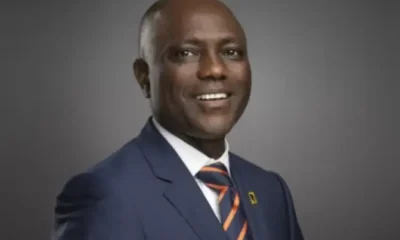News
Human Rights Violation: EDOCSO, CLEEN Foundation Want Govt To Strip Police Right Of Prosecutions
Published
4 years agoon
By
Editor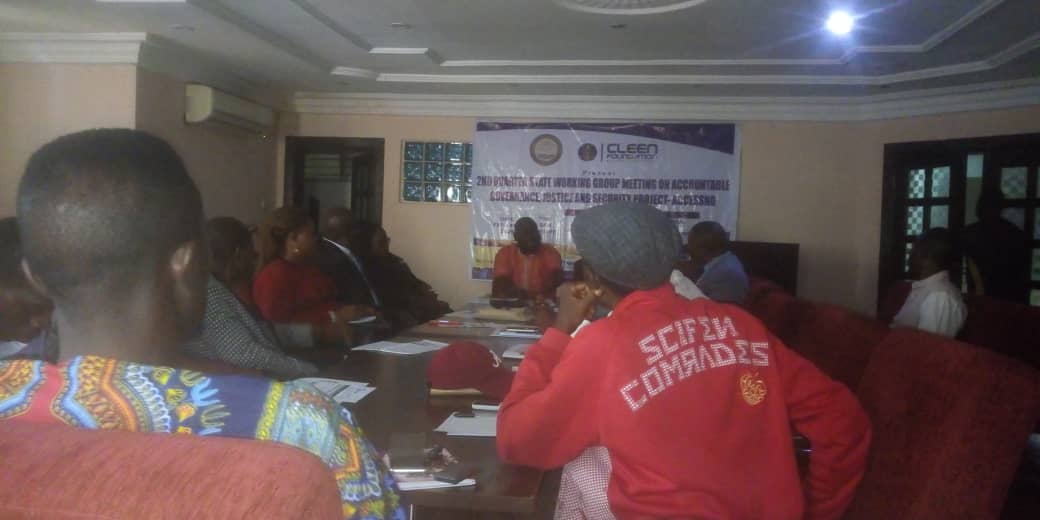
A right group, Edo Civil Society Organizations (EDOCSO) in collaboration with the CLEEN Foundation Wednesday, February 19, called on the Federal and state governments to strip the Nigeria Police of the power to prosecute suspect facing criminal trials in court to end violation of the rights of citizens.
While making the call in Benin City during their 2nd quarter state working group meeting on accountable governance, justice and security project-accessing, they said law given the Nigeria police the right to investigate, arrest and prosecute a suspect has led to the violation of the rights of citizens.
Speaking on the topic: ‘Challenges in the Implementation of Administration of Criminal Justice Law of Edo State and Way Forward’, Assistant Chief State Counsel, Ministry of Justice, Department of Public Prosecutions, Edo State, Mrs. Odihirin Justina, recommended that police should be given right to arrest and investigate and thereafter should hand to the Ministry of Justice for prosecution.
READ ALSO: Suspected Herders Attack Community, Kill Two In Edo
She said Kano State government has applied such law, Lagos State is following suit, stressing that there is need for Edo State government to quickly apply such for her citizens not to be unlawfully detained.
According to her, the decision of the police to take up the roles of prosecution, has led to unlawful detentions of citizens in custody.
“In Ministry of Justice today, we discovered that 70 percent of the files on our table brought in by the police are those who don’t have anything to do in detention at all.
READ ALSO: Borno Burns, Bayelsa Boils, Buhari Dey Kampe
“So, when we in the DPP discovered that, we recommended that they should be released and they were released.
“I believed that this is happening because the police want to assume the role of arrest, investigation and prosecutions.
“I suggest that their roles should be narrowed to the arrest and investigation of criminal suspect while the prosecutions should be left with the DPP”, she added.
Corroborating Julianna’s recommendations, Coordinator-General, EDOCSO, Comrade Omubude Agho, said the state law given the Nigeria police the right to investigate, arrest and prosecute a criminal suspect have led to the violation of the rights of the citizens of the state which ordinarily ought not to have been.
READ ALSO: Group Takes Investment Campaign To Imo, Woos Potential Investors
Agho said the duty of the police should start with the arrest and the investigation of suspect and that upon completion of their investigations, should hand them over to the Department of Public Prosecutions (DPP) for onward prosecutions.
The one-day roundtable meeting gave opportunity to stakeholders to make contributions on the urgent need for Edo State government amend the criminal law in the state so as to end unlawful detention and prosecution in the state.
The meeting brought together Edo Dtate Ministry of Justice, Independent Corrupt Practice and Other Related Offences Commission (ICPC), Economic and Financial Crimes Commission (EFCC), Nigeria Bar Association and Edo Civil Society Organisations, but other stakeholders such as the Nigeria Police, Nigerian Correctional Services were absent.
You may like
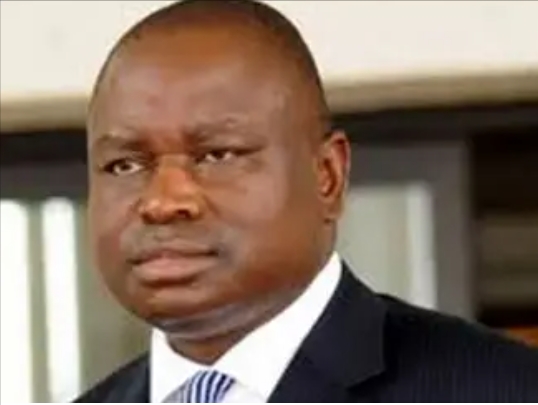
A former Senator who represented Enugu North Senatorial district in the National Assembly, Senator Ayogu Eze is dead.
A reliable source told Vanguard that Eze who was in the National Assembly between 2007 and 2015 died on Thursday in an Abuja hospital at the age of 66 after suffering from a protracted illness.
For the 8 years he spent in the Senate, Eze served as Committee Chairman on Information and Media during the first four years and after his reelection to the senate in 2011, was appointed chairman committee on works.
READ ALSO: JUST IN: Protesters Storm APC Secretariat, Demand Ganduje’s Resignation
Eze also served as a member of committees on Police Affairs, National Planning, Marine Transport and Federal Character & Inter-Government Affairs and also member of the Constitution Drafting and Amendment Committee that made some novel changes to Nigeria’s 1999 constitution.
A youth leader from his community, Umuiyda autonomous community in Igbo-Eze North Local Government Area, Ikechukwu Eze who confirmed it, said he can’t talk now because they are in shock over the sad news.
He said the death of Senator Eze was a big loss to the zone and Nigeria in general.
READ ALSO: B-I-Z-A-R-R-E! Mother Sets Self, Two Daughters Ablaze
“We heard the sad news. We are mourning him now. His death is a loss to us, the state and Nigeria,” he said.
Sen. Eze, born 23 November 1958, was elected Senator for the Enugu North Senatorial District of Enugu State, Nigeria, taking office on June 5, 2007.
News
Edo: FRSC Threatens Sanction On Truck Drivers Loading Goods, Passengers Together
Published
37 mins agoon
April 25, 2024By
Editor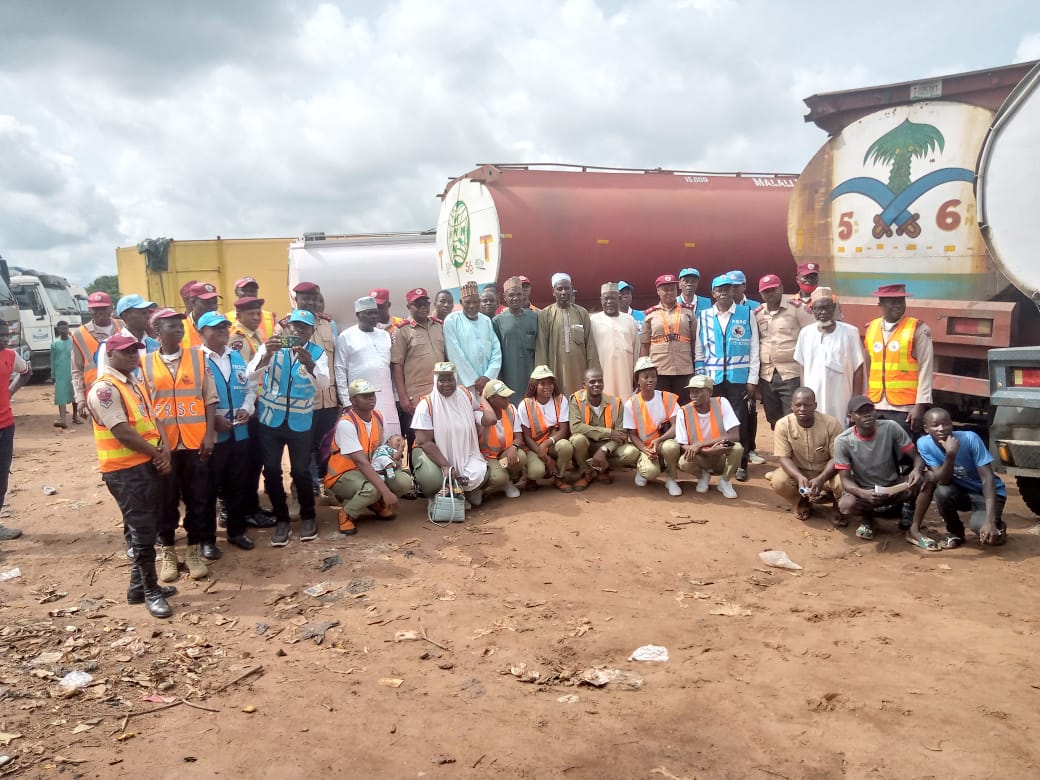
The Edo State Command of the Federal Road Safety Commission (FRSC), has threatened to clamp down on truck drivers who carry loads and passengers together.
The Edo State FRSC Sector Commander, Paul Okpe, disclosed this during a sensitizion of the National Union of Road Transport Worker (NURTW), Aduwawa Truck Drivers chapter, on the need to stop the carrying goods and passengers together.
Okpe, while warning the truck drivers to desist from the act, said the sensitization was to engage the leadership of the truck drivers union on how to drive on the highway, imbibe safety culture, and stop using truck to carrying load and passengers.
READ ALSO: JUST IN: Four-year-old Boy Dies In Abuja School, Parents Suspect Foul Play
“We are going to go round other locations of the union in the state to also sensitise them. It is not a good practice and when an accident happens, most of the passengers always die, and we want to reduce accidents on the road,” he said.
He added: “We are happy that the drivers are keying into the exercise, assured us of their support. They have also given us good advice especially stopping the loading of passengers and goods from the north.”
According to him, after sensitisation, the corp will commence enforcement on erring drivers.
He noted: “With the assurance they gave us we are sure that the menace would be eradicated.
READ ALSO: Software Engineer Sentenced To Life In Prison For R*ping Neighbour’s Daughter
“We are using public enlightenment and enforcement to curb this menace.This campaign, launched by the Corp Marshal, Alhaji Dauda Biu is ongoing across the country” he said .
He, however, called on the drivers to imbibe road safety culture and refrain from carrying animals and passengers, saying it is not a good practice
On his party, the Chairman, NURTW Heavy Truck Drivers, Aduwawa branch, Alhaji Badamasi Muhammed, commended the FRSC for the sensitization and assured them of total support.
“This issue has been worrying us, but we are not a government that can stop it, but now thayt government is interested, it is going to stop. And they should stop it from the north where they are loading goods and passengers.
“So, we will join the FRSC and talk to our driver to ensure that loading of goods and people together is not good and should be stopped. Last time, about 50 people died when a truck conveying cows and human beings had an accident,” he said.
News
How Flight Engineer Saved Us From Disaster — Ex-DG, Bureau of Public Service Reforms
Published
6 hours agoon
April 25, 2024By
Editor
A former Director-General, Bureau of Public Service Reforms, Dr Joe Abah, has narrated how a ground engineer saved travellers on an Ibom Airlines flight from a “potential disaster”.
Narrating the experience on his X handle on Thursday, Abah said he boarded a 7 am flight from Lagos to Abuja on Thursday morning and the flight was ready to take off when the unusual happened.
The popular public commentator explained that he was on the flight heading to Abuja with the co-founder and Director of BudgIT, Oluseun Onigbinde when they heard a loud knock on the aircraft door.
He wrote, “I boarded a 7 am @ibomairlines flight in Lagos this morning, heading to Abuja. My brother @seunonigbinde was on the same flight and we had chatted briefly about work. The aircraft door was shut, phones switched off, and ready for takeoff.
READ ALSO: German Police Arrest 11 Nigerians For Dating Scam, Money Laundering
“As we were about to start taxiing, there was a loud knock on the aircraft door from outside. We all wondered what it could be. The knocking got more persistent. The attendant had to open the door again.
“As she did, a ground engineer came in and those of us in front clearly heard him say “You can’t go. Your landing gear is bad.”
“The pilot made a ‘political’ announcement that they needed to perform some additional checks before take-off and apologised for the delay. He spoke with the engineer and, a few seconds later, announced that we were to disembark.
“I thank God that we have the systems in place to check this and avert potential disaster. And that we have some diligent Nigerians who take their work seriously.
READ ALSO: Edo Cultists Kill Rival In Daughter’s Presence, Abandon Getaway Car
“If you are that young Nigerian engineer, God will bless you abundantly.”
He also urged the Nigeria Civil Aviation Agency to help him identify the engineer for him to personally thank their ‘saviour’.
Speaking with our correspondent on Thursday morning, the Ibom Airlines spokesperson, Annie Essienette, confirmed the development.
She said, “It is a technical thing. We were about to take off and someone called that the gear was faulty. So, the next thing to do was to disembark the passengers.
READ ALSO:JUST IN: Flights Diverted As Fire Breaks Out At Lagos Airport
“We are working on rescheduling the flight to accommodate the passengers so the faulty gear could be repaired accordingly and that is what we are doing.”
On Wednesday, the Federal Government suspended Dana Airline operations due to concerns surrounding safety.
This is coming after an aircraft belonging to the airline, with registration number 5N BKI, skidded off the runway at the Murtala Muhammed International Airport in Lagos on Tuesday morning.
The aircraft, which flew from Abuja to Lagos, skidded off the runway in an attempt to land.
However, no casualty was recorded.
However, the Ministry of Aviation, through the Nigeria Civil Aviation Authority, suspended the airline’s operations in the country until a comprehensive audit is conducted.

JUST IN: Former Deputy Gov, Ajayi Agboola Wins Ondo PDP Primary

JUST IN: Senator Ayogu Eze Is Dead

Edo: FRSC Threatens Sanction On Truck Drivers Loading Goods, Passengers Together
Trending

 Entertainment3 days ago
Entertainment3 days agoBridesmaids’ Dance At Wedding Causes Stir On Social Media [VIDEO/PHOTOS]

 Politics4 days ago
Politics4 days agoEdo Guber: Akoko-Edo PDP Leaders Meet In Igara, Describe Ighodalo, Ogie As ‘Perfect Match’

 Metro3 days ago
Metro3 days agoVIDEO: ‘UNN Lecturer’ Caught Pants Down With Married Student

 News4 days ago
News4 days agoOutrage As Chinese Supermarket In Abuja Denies Nigerians Entry

 News5 days ago
News5 days agoJapa: Types Of US Visa Available To Nigerians, Other Foreigners

 News3 days ago
News3 days agoIGP, Jonathan Disagree Over State Police

 Headline2 days ago
Headline2 days agoMeet 17-year-old Nigerian Who Won $3.5m Worth Of Scholarships From Harvard, 13 Other Foreign Universities

 News2 days ago
News2 days agoBREAKING: Dangote Further Crashes Diesel, Aviation Fuel Price

 Headline2 days ago
Headline2 days agoDrama As Women Fight Dirty, Breasts Fall Out During Spring Break Outing In US [PHOTOS/VIDEO]

 Business4 days ago
Business4 days agoJUST IN: FirstBank Gets New MD/CEO















